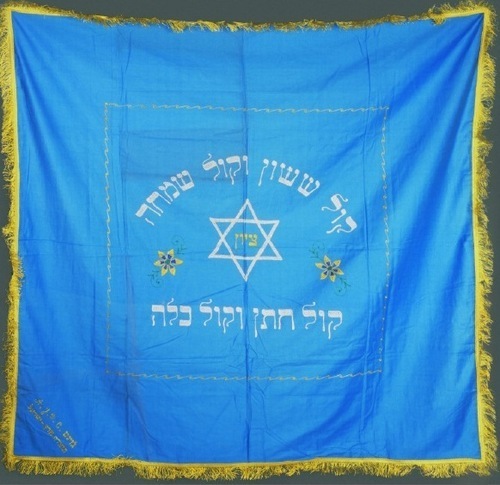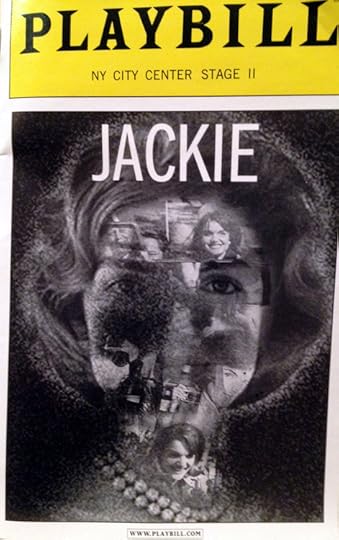Lily Brett's Blog, page 10
April 2, 2013
When I look at this chuppah I see absence. The absence of...

When I look at this chuppah I see absence. The absence of laughter and the absence of joy. The absence of the bride and groom and the absence of their voices.
Absence can be surprisingly loud. It can take up a lot of space. And for something that isn’t there, it can be very present. Among the brides and grooms who were standing under chuppahs like this in 1946, 1947, 1948 and later, were so many mismatched couples. So many unlikely couplings.
People marrying each other to have someone to touch. Someone to belong to, someone to love. People rushing into each other’s arms because when you have been starved of arms, any pair can seem to be the right arms.
In this chuppah, I see women who will never dance at their daughters’ weddings. Daughters who will never stand under a chuppah. Fathers who will never escort the bride to her wedding or beam when their son marries his new wife. I see the aunties and uncles who will never gather as a family to celebrate a simcha.
Among the brides who were standing under a chuppah like this, were people who had stood under a chuppah before. People who had wives who were murdered, husbands who were slaughtered and children who were used by the Nazis as footballs until the children were nothing but pulp.
There were dead guests at almost all of the weddings. And there were grief-stricken and heart-broken brides and grooms.
My parents, who were on the last transport to Auschwitz from the Lodz Ghetto, were a rare statistic. Two Jews who were married to each other before the war who each survived. My mother, whose mother and father and four brothers and three sisters were all murdered, searched for my father for six months, after the war. She knew almost everyone she loved was dead. She wanted to die herself. But she kept searching for my father. She found my father, whose parents and sister and brothers had all been murdered, in Feldafing, the DP camp not far from Munich.
One year later, when I was born, they were both still DP’s, displaced people, still under the auspices of Feldafing and still trying to get out of Germany.
The local Germans, my father said, viewed the DP’s as criminals. The rationale was that because they were former prisoners they must have committed criminal acts.
My father bartered the cigarettes and coffee given to him by The Red Cross and saved up to buy my mother a leather jacket and a wedding ring. They were married again, in Germany, under a chuppah like this one. And were so happy and grateful to be together again.
My father loved my mother with a passion that never abated. A passion that wasn’t diminished by separation, imprisonment, starvation, torture and enormous loss. He still talks about her with great tenderness, twenty-six years after her death.
When I got married, I didn’t stand under a chuppah. I think I wanted to distance myself from my past. But the past isn’t easy to discard. You can’t just shuck it off. And that is, I think, not a bad thing.
When my younger daughter, the first of my children to marry, stood under a chuppah, a simple chuppah, four poles with a black and white men’s prayer shawl as a canopy, I felt overwhelmed. I suddenly felt joined to all the aunts and uncles I’d never known. To Abramek, Felek, Jacob, Moniek, Tadek, Bluma, Chava, Taube, Rooshka. I was part of all the cousins I had never met. I was with the grandparents I had fantasised about for most of my life.
I looked at my father, a man who after the war gave up on God and dismissed tradition as being meaningless. My father looked as though he was going to cry. ‘I didn’t know she was going to be standing under a chuppah,’ he said to me.
March 26, 2013
I can write by hand again. With no pain. I am so happy. I have...

I can write by hand again. With no pain. I am so happy. I have written all my books by hand. I can’t think in the same way when I am typing. I took ages to choose which of my notebook to make notes in. I finally decided on a pink one. I don’t usually write in notebooks as soon as I buy them. I like to live with them for a while before using them. When I opened this notebook I found a note that said ‘Bought in Gibert Jeune, in Paris, on September 13th 1983.’ I decided it was time to start writing in it.
March 20, 2013
I saw the Elfriede Jelinek play “Jackie” on...

I saw the Elfriede Jelinek play “Jackie” on Saturday. The play was challenging and intoxicating. It was so uplifting and energizing to experience something that was so brave and so truthful an exploration. The play is being staged in New York by the Women’s Project at the City Center Stage 11 until March 31st. It is really worth seeing.



